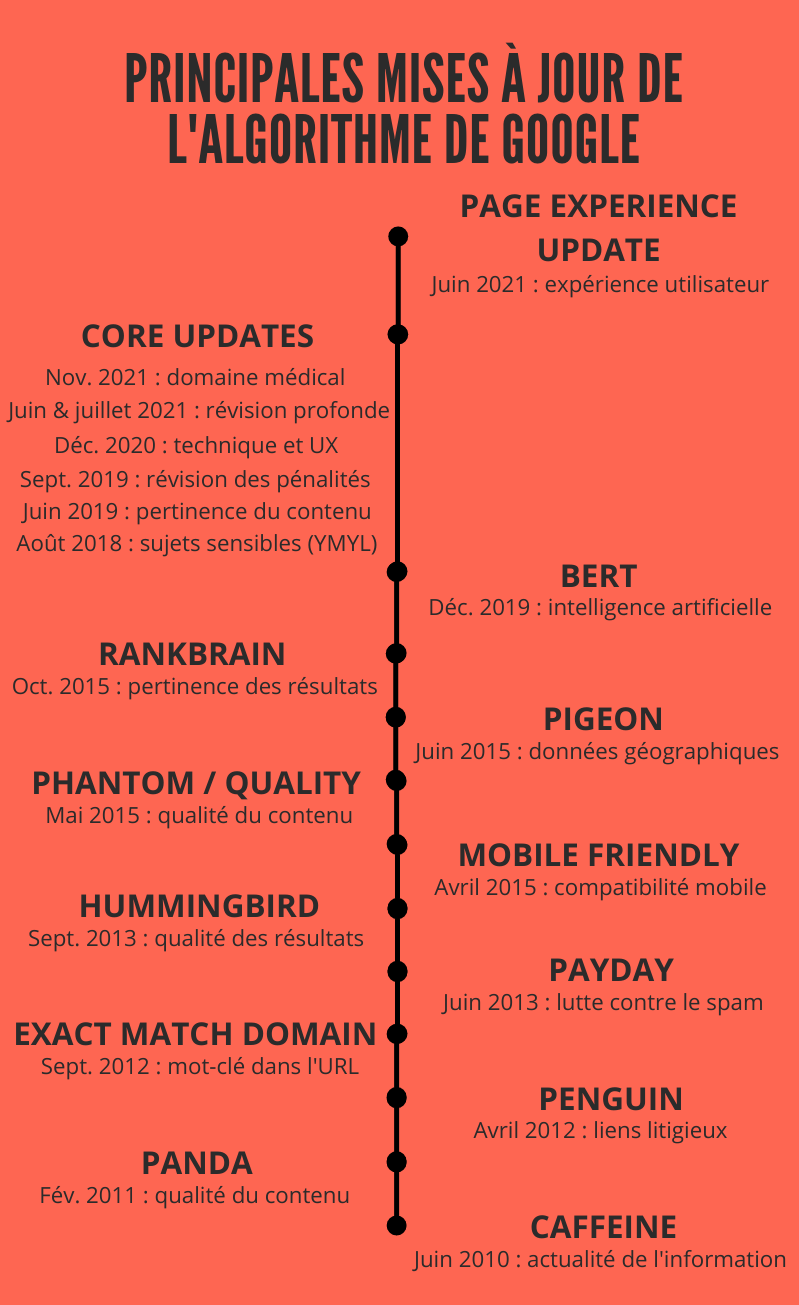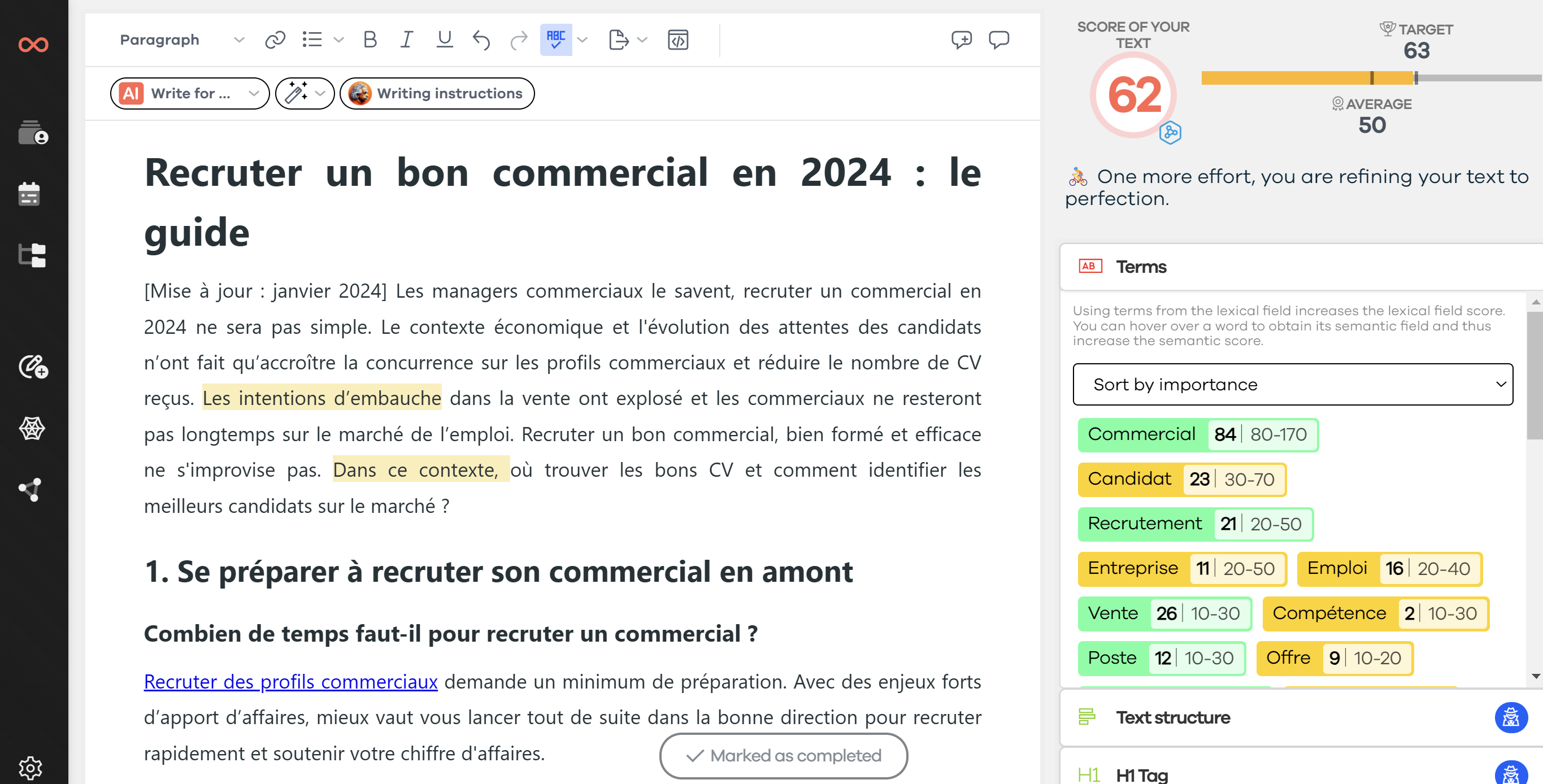Do you want to improve the visibility of your website in a sustainable way? If so, you must understand how Google's algorithms work. Indeed, it is by knowing the expectations of the search engine and respecting its guidelines that you can benefit from a good organic ranking. In this article, I will explain everything you need to know about Google's search algorithm. I will then describe in detail the 13 updates that have forever influenced SEO.
🕸 A few words about Google

If you want to understand how Google's algorithm works, you must first know some basics about the search engine. Once you have a global vision of its functioning, it is then easier to assimilate the different evolutions that this web giant has experienced. Today based in the imposing Googleplex in Mountain View (California, USA), the concept was launched in 1998, in a garage much more rustic. It was at that time that Larry Page and Sergey Brin had the brilliant idea of creating a tool to group together the information available on the Internet.
By gathering all this data and presenting it in an organized way to users, they have definitely marked the history of the Web. To develop this search engine, which was still somewhat rudimentary, they created the very first online search algorithm. Since then, even though it has evolved enormously, its principle has remained the same. It is based on a system comparable to a spider that crawls its web (web in English!) and consists of three fundamental steps.
- **Crawling: Google's robot (called Googlebot) crawls the entire Web to find all internet pages (according to the latest statistics, there are currently more than two billion). To go from page to page, it needs external and internal links, hence the importance of link building and internal linking.
- Indexing: the information collected by Google's indexing robot is then analyzed according to various criteria, such as the lexical field (the famous keywords!) or the presence of images. This allows grouping all this content in a huge database.
- Positioning: when a user submits a query in the search bar, Google analyzes its indexed pages to try to provide the best possible answers. This is mainly where algorithms come into play and are essential for what is now called organic ranking.
💡 How Google's algorithms work

First of all, know that there is not just one algorithm, but hundreds! All these algorithms are stacked on top of each other and work either in a combined or independent way. It has reached such a point that even Google's engineers do not know exactly how this complex process works and what really influences the ranking of pages in the SERP. As a result, some algorithmic updates even sometimes have a "backpedaling" effect on Google's ranking.
What we do know is that depending on the topic searched and the search intent, some of these algorithms are favored to provide an explicit response. According to the information provided on Google's blog, there would be hundreds of billions of indexed pages in their giant "library"! They therefore had to create precise formulas that allow them to solve this sorting quickly and efficiently. Among all these parameters, five factors seem to be decisive.
1. Analysis of search terms
Based on complex linguistic models, Google is able to understand the meaning of the query and the chains of words to be searched for in the index. They can also determine the type of information desired: news, local, image, purchase, etc. It should also be noted that artificial intelligence has reached such a point that spelling mistakes are interpreted correctly and that taking synonyms into account is possible in real time.
2. Matching search
Once your query is understood, Google performs a matching search within all indexed pages. Based on the words you have chosen, an in-depth analysis of the lexical field is done to find these same terms in the texts and titles. An external and independent check also determines the interest of the displayed results and constantly evolves the relevance of the SERP (Search Engine Result Page).
3. Ranking pages according to their usefulness
This is where the algorithms that interest everyone who wants to be visible on the Internet through SEO come into play. Hundreds of Google ranking criteria, more or less known, are used to check the quality of indexed pages. These criteria are mostly based on what is called the three pillars of organic ranking, namely technique, content, and popularity.
4. Displaying the best results
Based on the previous three elements, Google has already made a big selection thanks to its various algorithms. However, the engineers at Mountain View want to offer the best possible user experience to Googlers. Therefore, before even displaying the results, other factors are taken into account, such as display on different browsers or digital reading devices and whether the loading time is correct even for slow internet connections.
5. Taking context into account
The last step before the search engine results page appears is taking your personal context into account. Indeed, Google is interested in your current position, your search history, and the news close to you to provide personalized information. Although this system is controversial, it is true that it is quite pleasant to have proposals that correspond to us. To obtain more neutral results, you can use the private browsing function.
⚠ The 13 Google updates to know

Since the creation of Google in 1998, the algorithms have continued to evolve. The two main motivations for these updates are to provide results that are most in line with search intentions and to prevent SEO specialists from taking advantage of discovered loopholes (such as keyword stuffing or massive external link purchases). Before 2010, SEO specialists were mainly interested in the toolbar called PageRank. However, even if this factor remains at the basis of the algorithm's functioning, its display has now disappeared from the SERP.
Since then, there have probably been hundreds of updates, most of which have not even been disclosed. However, some have had such an impact on organic ranking that they are absolutely necessary to know. Here is the list of the 13 main updates that you cannot ignore if you want to be visible on Google. However, be aware that no Google algorithm is disclosed in its entirety and that only guidelines are published to allow website owners to adapt to changes.
1. Page Experience Update
In June 2021, Google announced the implementation of a new algorithm that would take into account the user experience on web pages. The signals emitted during use thus become a factor that can influence organic ranking. Navigation simplicity, readability, and advertising are, for example, elements that matter in SEO. The update is based on the essential web signals LCP (Largest Contentful Paint), FID (First Input Delay), and CLS (Cumulative Layout Shift). To learn more, visit this link.
2. Google Core Updates
Between 2018 and 2021, six algorithm updates were called "core update" because of their major impact on the display of Google's results page, and therefore on organic ranking. For each, the Google algorithm has been thoroughly reviewed, hence their significant influence on the SERP.
2.1 November 2021 Core Update
In November 2021, this algorithm update was widely controversial because it took place at the same time as Black Friday. Thus, at a crucial moment in online commerce, the first changes were observed, leading to numerous complaints from the stakeholders involved. An impact has, it seems, mainly been noticed on medical sector websites, although Google has remained very vague about the changes made (as usual!).
2.2 June & July 2021 Core Updates
Unusually, this algorithm update was launched in two phases, one in June and the other in July 2021. However, the effects of these changes were not as significant as SEO specialists expected. Some areas, such as streaming or music sites, saw their visibility increase. On the other hand, other areas, such as online commerce or translation sites, saw their organic traffic decrease.
2.3 December 2020 Core Update
In December 2020, an update concerning the calculation of content quality, technical performance, site structure, and UX (user experience) was announced. Feared by all, its effects were, however, well below what was expected. The goal of this core update was to try to improve the way indexing robots position pages on the search engine.
2.4 September 2019 Core Update
Announced on Twitter on September 24, 2019, the effect of this update surprisingly turned out to be rather positive for sites that had been poorly positioned until then. It seems that those who had suffered greatly from previous penalties then experienced a rebound in the SERP. It was therefore very good news for all websites that had struggled to recover from a downgrade due to abusive practices.
2.5 June 2019 Core Update
This is the very first time that the search engine chose to announce a core update on Google's official Twitter. The themes addressed were then the loading speed (for which the SEO impact is still not demonstrated), the HTTPS (again, no real influence observed), and the relevance of the content offered. It is precisely on this last point that the main changes have been most observed. Another major upheaval was the more frequent appearance of YouTube results at the top of the SERP.
2.6 August 2018 Core Update
Also called Medic Update, this algorithm update mainly concerned the most sensitive subjects, such as health, finance, and e-commerce. The goal was to strengthen the safety of users regarding topics that could lead to dramatic results. However, Google later informed the public that it should have an influence on all sites and not only on the pages then called YMYL (Your Money Your Life).
3. Google BERT
Officially announced in France on December 9, 2019, BERT demonstrates to what extent the search engine is increasingly resembling a highly complex artificial intelligence. The implementation of this new technology (Bidirectional Encoder Representations for Transformers) is to integrate words and disambiguate them through word embedding. This would allow the user to benefit from better display for voice queries or those containing errors. However, its effect on SEO has not been as significant as Google had announced.
4. Google Rankbrain
Introduced in October 2015 as an extension of Google Hummingbird (point 7), Rankbrain is an automatic learning system aimed at improving the relevance of search results. This technique allows Google to better understand long-tail queries or phrases that had never been searched before. This update has had a significant influence on web writing, favoring lexical field and semantics over simple keywords. This is, in fact, one of the areas in which the SEOQuantum tool excels!
5. Google Pigeon

Appeared in the United States in 2014, this new algorithm was not implemented in France until June 2015. It mainly impacted businesses and local shops. This step also represents the beginning of the importance of Google MyBusiness listings. Indeed, this Google update began to take into account the geographical data of the user to offer geolocated results. Its influence was then noticed both in the SERP and on Google Map.
6. Google Phantom (or Google Quality)

Also known as Quality, this update was first denied by Google. However, in May 2015, the SEO world was completely disrupted at that time. Hence the fact that this update was first called "Phantom." Although no details were given, the engineers later admitted that the algorithm had been modified to improve the analysis of the quality of the content offered by the search engine results pages.
7. Mobile Friendly
On April 21, 2015, Mountain View announced the implementation of its new algorithm aimed at favoring sites with good mobile compatibility. Implemented in real-time and page by page, it was with horror that some owners saw their visibility on the Internet plummet day by day. Since then, it has become essential for a website to be compatible with display on mobiles and tablets. The revolution in ranking in the SERP was such that this update was even nicknamed "mobilegeddon" (in reference to Armageddon).
8. Google Hummingbird

In September 2013, one of the most important updates to Google's algorithm was launched. Known as Hummingbird in French, this real revolution has improved both the quality and speed of the search results. User queries are better understood, even when they are complex or unique. That is why Rankbrain, deployed two years later, is considered the logical continuation of Google Hummingbird.
9. Google Payday
Payday represents the official beginning of Google's fight against spam. Indeed, in June 2013, the search engine decided to simply remove from the results pages containing information assimilated to spam. The following themes are thus concerned: credits, counterfeiting, online games, etc. This is therefore the moment when Google first asserts its ambition to want to protect users from dangerous sites that could have a negative effect on the well-being of the user.
10. Exact Match Domain
Before September 2012, if you called your site "cheap-running-shoes," you would have been heavily favored for your organic ranking on this exact query. Google changed the game by launching a new update to its algorithm. The influence of the URL has therefore been considerably reduced in order to promote above all relevant and quality content. Today, the importance of web page addresses seems to play only a minor role in organic ranking.
11. Google Penguin

Officially launched in April 2012, the new Penguin algorithm has completely transformed organic ranking. This search filter aims to penalize websites that do not comply with Google's guidelines. The goal was clearly to fight against the creation of backlinks made abusively (exchange and purchase of links). Website developers and other webmasters then had to spend a lot of time disavowing disputed links and cleaning up their own sites.
12. Google Panda

This very first known search filter was implemented in February 2011. The purpose of Google Panda is to provide high-quality content. Google's tactic was therefore to penalize websites that had abused keyword stuffing (which was already contrary to the recommendations made by the search engine!). The effect of this new algorithm had a huge impact on the positioning of millions of web pages and its influence is still felt today.
13. Google Caffeine

Google Caffeine (caffeine in French) is the first revolution of Google's algorithm updates. Deployed in June 2010, it mainly serves to speed up the indexing process. Indeed, from now on, a page can be indexed immediately after being crawled by the Googlebot. Thanks to this evolution, the timeliness of the information transmitted on the search engine has been significantly improved.
The search engine leader is constantly evolving. It seems that the goal of all of Google's algorithms is to improve the factors that are most important to Mountain View.
- Provide quality content.
- Analyze the lexical field and semantics of texts.
- Ensure the safety of users.
- Improve the user experience.
- Fight against fraud.
If you want your website to be visible on the search engine, you must constantly keep up to date with algorithm updates. And the key to success is to scrupulously follow the recommendations made by Google's engineers. You may have noticed that I did not mention Google EAT in this blog post. This is simply because, more than an algorithm, it accurately describes the best SEO practices. If you want to learn more about this topic, I suggest you read the following article: https://www.seoquantum.com/billet/google-eat.
Need to go further?
If you need to delve deeper into the topic, the editorial team recommends the following 5 contents:
- Enhancing Content for Google with Search Console Insights
- 17 Techniques to Find a Link Building Opportunity and Link to Your Content
- How to Create a Link Building Strategy for Acquiring External Links (Backlinks)?
- Google EAT Criteria: Why is it Important for SEO?
- Google MUM | The New Algorithm That Will Impact SEO (Or Not)

